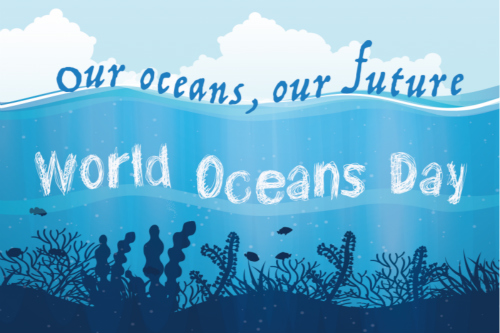
Message from Ms. Audrey Azoulay, Director-General of UNESCO, on the Occasion of World Oceans Day文章源自英文巴士-https://www.en84.com/5443.html
联合国教科文组织总干事奥德蕾·阿祖莱世界海洋日致辞文章源自英文巴士-https://www.en84.com/5443.html
文章源自英文巴士-https://www.en84.com/5443.html
Clean Our Ocean文章源自英文巴士-https://www.en84.com/5443.html
清洁我们的海洋文章源自英文巴士-https://www.en84.com/5443.html
文章源自英文巴士-https://www.en84.com/5443.html
8 June 2018文章源自英文巴士-https://www.en84.com/5443.html
2018年6月8日文章源自英文巴士-https://www.en84.com/5443.html
文章源自英文巴士-https://www.en84.com/5443.html
The ocean is home to the majority of species living on our planet. It provides more than 60% of “ecosystem services” that allow us to live, starting with the production of most of our oxygen, and climate regulation: in the last half century, the ocean has absorbed 93% of the excess heat linked to the increase in the greenhouse effect.文章源自英文巴士-https://www.en84.com/5443.html
地球上大部分生物栖息在海洋。我们所赖以生存的生态系统服务,60%以上由海洋承担,例如生产大部分氧气并调节气候:过去半个世纪,海洋吸收了因温室气体增加而造成的超额热量的93%。
The ocean is a prerequisite for the possibility of life on Earth. It is endangered, however, by the overexploitation of resources, pollution and increasing CO2 absorption. Global warming, acidification, dead zones, harmful algal blooms and ecosystem degradation are phenomena that reflect the impact of human activities on the ocean.
海洋关系地球生命的存续。然而,资源过度开发、污染以及二氧化碳吸收量的不断增加危及海洋。全球变暖、酸化、死区、有害藻华、生态系统恶化等现象都是人类活动对海洋造成的后果的体现。
This year, the discovery in the Gulf of Oman of a new “dead zone” which is larger than Scotland and still growing, highlighted the phenomenon that occurs when marine life becomes asphyxiated in ocean areas with drastically low levels of oxygen. This plight comes on top of overfishing and pollution, particularly that caused by plastic waste, which is dumped into the ocean at the rate of one lorry load per minute, entering our food web. This has major implications for food security. Part of this waste is concentrated in ocean areas called gyres, caused by circulating ocean currents.
今年在阿曼湾发现了新的“死区”,面积超过苏格兰,且仍在扩大,它凸显了海洋生命因含氧量极低而遭窒息的现象。除了死区,还有过度捕鱼以及污染的问题,尤其是塑料垃圾污染,塑料垃圾以每分钟一卡车的速度倾泻入海并进入我们的食物网。这对于全球食品安全产生重大影响。部分塑料垃圾因洋流而在某些海洋区域不断聚集,形成“涡旋”。
There are, nonetheless, solutions to combat such disasters. In places where destruction has ceased, life has returned. The marine environment can demonstrate resilience if we allow it to recover from anthropogenic stresses through good management of its ecosystems.
面对种种灾难,我们并非没有解决方案。停止破坏,海洋便会重现生机。若能通过良好的生态系统管理使其从人为干扰中恢复过来,海洋环境是可以展现其复原力的。
With the aim of encouraging international scientific collaboration to address such challenges, on 5 December 2017, the United Nations General Assembly proclaimed the Decade of Ocean Science for Sustainable Development (2021-2030). The UNESCO Intergovernmental Oceanographic Commission (IOC) has been mandated to coordinate its preparation and implementation.
正是为了促进国际科学合作以迎接这些挑战,2017年12月5日,联合国大会宣布海洋科学促进可持续发展十年(2021–2030年)。教科文组织政府间 海洋学委员会受托协调十年的筹备和实施。
In line with the 2030 Agenda and its Sustainable Development Goal on the conservation and sustainable use of the ocean, this Decade will be a unique opportunity to mobilize all stakeholders around a common agenda of research and technological innovation to gain a better understanding of the factors affecting this resource, their consequences, and to provide the best responses.
根据《2030年可持续发展议程》及其“保护和可持续利用海洋”目标,该十年将提供一个独特的机会,动员所有相关方,开展共同研究和技术创新计划,以便更好了解影响海洋资源的因素及后果,并找出最佳的应对之策。
This goal requires up to the mark investment. According to the Global Ocean Science Report published in 2017, it currently represents only 4.5% of the public funding allocated to natural sciences at the global level. We cannot sit back and allow this situation to continue.
这一宏伟目标需要相应的投资。根据2017年发布的《全球海洋科学报告》,全球范围而言,相关投入仅占自然科学公共经费的4.5%。这种情况不能再继续下去。
No country alone is capable of measuring changes in the ocean, nor of cleaning and protecting it. Through international cooperation, technology transfer and knowledge sharing, we can succeed in developing environmentally friendly policies that promote sustainable growth based on the ocean.
无论是测量海洋的变化,还是清洁和保护海洋,任何一个国家仅凭一己之力,都无法完成。唯有通过国际合作、技术转让以及知识共享,我们才能在立足海洋、注重环保的基础上制定出促进可持续增长的政策。
On this World Oceans Day, UNESCO invites Member States, the scientific community, civil society and the private sector to join forces, following the maxim of the Japanese writer Ryūnosuke Akutagawa: “Individually, we are one drop. Together, we are an ocean.”
值此世界海洋日之际,教科文组织呼吁会员国、科学界、民间社会以及私营部门共同努力,诚如日本作家芥川龙之介所言:我们分如水滴,合为大海。”
俄文、法文、西文、阿文版:https://pan.baidu.com/s/1ytFvhnsgeFJdGJ2tZx_5_Q

